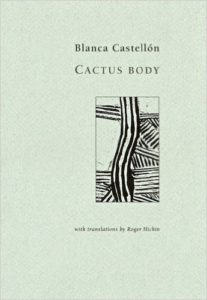Cactus Body
 by Blanca Castellon,
by Blanca Castellon,
Translation by Roger Hickin,
Cold Hub Press, 2014,
44 pages, paper, NZ$19.50,
ISBN: 978-0-473-26533-5
Buy the Book
Blanca Castellon’s slim Spanish and English chapbook, Cactus Body, is one I’ve returned to regularly this past year, thanks to New Zealand poet Roger Hickin’s eloquent translations. Castellon, from Nicaragua, manages in the eleven poems collected here to be both political and lyrical. Mario Vargas Llosa has said that, in the western world, “to be a writer means, generally, first (and usually only) to assume a personal responsibility,” but that to be a writer, in at least some Latin American countries (Nicaragua makes his list), means “to assume a social responsibility.”
Blanca Castellon certainly gives us the personal in Cactus Body. In “From B. to B.” (with the parenthetic subtitle “When I lose myself ”), she writes a poem about herself addressed to herself. If someone at an open mic prefaced the reading of a poem with such a description, I’d head quickly for the doorway, but Castellon pulls it off, sounding neither narcissistic nor solipsistic. Of her absent self, she says:
I guess you’ve used
your wings
and risen
to the clouds
you like so much
. . .
Blanca, come down
I need you
and a sudden breeze
brought tears to my eyes
One suspects it’s her muse she misses (“Dear Blanca / I haven’t seen you of late”) though the wistful rather than urgent tone suggests inspiration might soon return.
Inspiration comes up again in “Vademecum,” another delightfully personal meditation in which she identifies poetry as a calling without regard to place or time, and tells us that stereotypes of the poet should be ignored.
To be a poet
the main thing is to be a poet
no matter if you wear
a moth-eaten overcoat
a beret
an earring
or tails
…
to know by heart
the best route to take
to the great beyond
and back
This poem is not about calling out poseurs and poetasters; it celebrates a universal vocation, “be it dust in love / you breathe / or Marilyn Monroe you invoke.”
Yet Castellon does not fail to do her Latin American duty. “Outside Times Ten and One Within” is a political poem of 11 sections, which in Hickin’s terse translation evokes Juan Gelman’s poems about Argentina. In Part IX, Castellon tells us:
The poor come back
to die in traps
there’s hunger
and a closed horizon
there’s dust
bones
and a welter of bodies
in a common sky.
Those last lines recall Gabriel Garcia Marquez’s discussion of how many people have died because of political tyranny in Central and South America. The sense of menace here is amorphous and not identified with any one war, coup, or despot, but in Part IV she writes:
field on field
Of lamentation
there’s Washington
Iraq
Somalia
Haiti
Yet the volume does not end with the sense of defeat that Carlos Fuentes once identified as a distinctly Latin American affliction. In “Anonymous Tree,” her nature poet’s heart leaps up as she observes a tree which “beckons lovingly” and is “utterly green / and lush with mysteries.” In “Sometimes However Earth Is Affectionate,” she seems to be writing about some imagined setting where the earth is fecund, friendly, and evocative of joy. There is no repression or imminent violent death in sight.
Appropriately, she concludes with a poem called “Birth.” What’s being born is a poem whose “cactus body” she tells us, “stores water, for days of thirst.” Castellon’s poems, thanks to Hickin, have been a source of sustenance for this reviewer, who hopes to keep drinking, and to hear from both of them again soon.
— Kevin Sweeney

